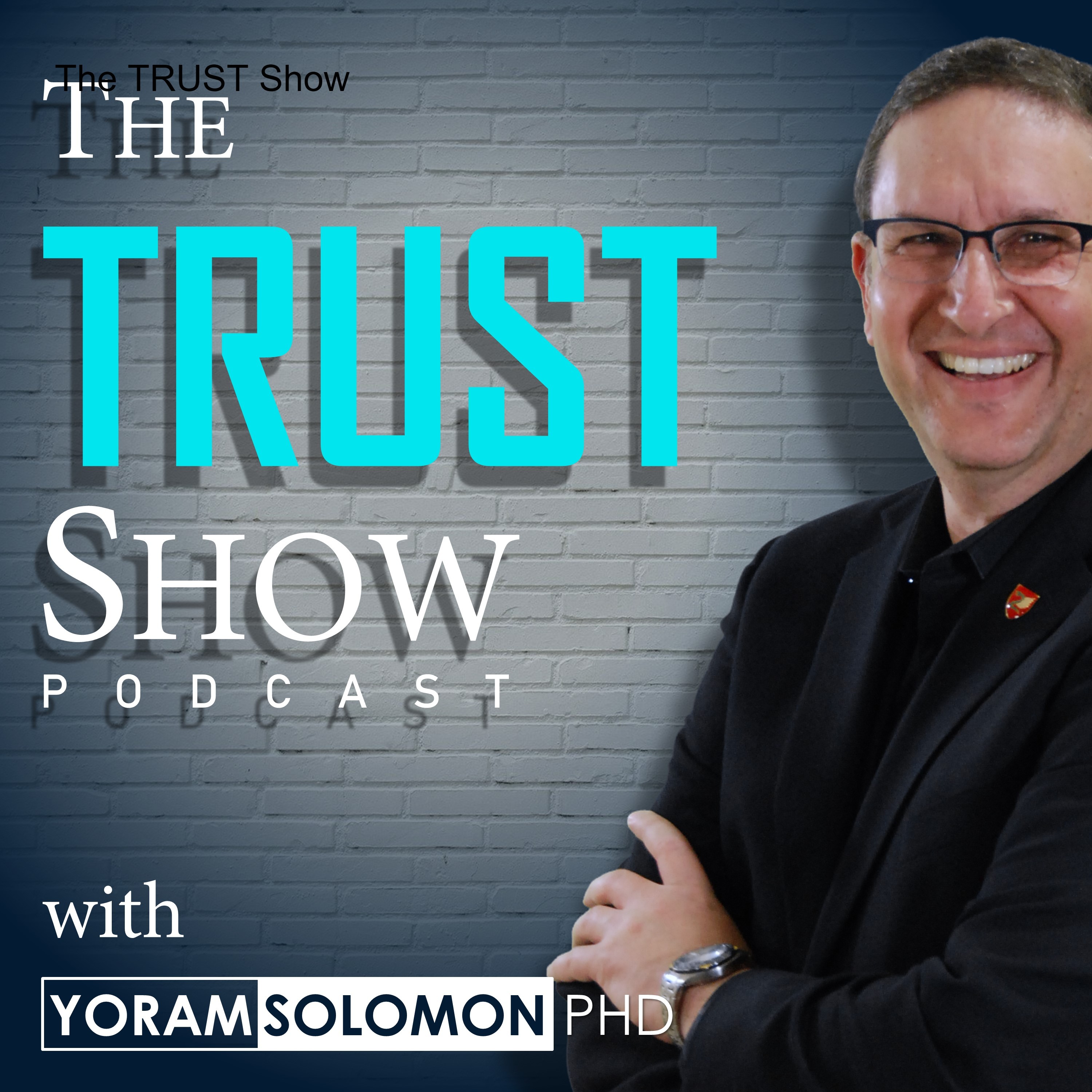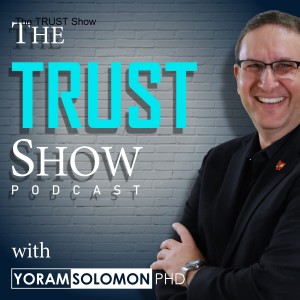
17.3K
Downloads
195
Episodes
Trust is not what you think it is. It is not absolute or universal. Trust is relative. The same behavior that would cause one person to trust you could cause another person to distrust you. The level of trust someone has in you is the product of their trustfulness (their willingness to trust other people) and your trustworthiness. There is almost (I said ALMOST) nothing you can do about the former, and everything you can do about the latter. Because of that, you must evaluate your own trustworthiness one relationship at a time, separately. Odds are, though, that the same behaviors that are holding you back from being more trusted in one relationship are holding you back from being more trusted in other relationships. Welcome to The Trust Show. I’m your host, Yoram Solomon, a top 10 trust expert and researcher, the author of the book of trust, and the creator of the Trust Habits® workshop that helps people and organizations form new habits that change old behaviors, build trust, and transform organizations. In this educational podcast, I will challenge you to think differently about trust, through the 8 laws of trust and the 6 components of trustworthiness. I will share my own stories, experiences of others, trust research, and sometimes, reflect on a news item. And through those, I will show you how to build trust, be trusted, and know who to trust. Because the answer to this question will have the biggest impact on your personal and professional, success or failure: can you be trusted?
Trust is not what you think it is. It is not absolute or universal. Trust is relative. The same behavior that would cause one person to trust you could cause another person to distrust you. The level of trust someone has in you is the product of their trustfulness (their willingness to trust other people) and your trustworthiness. There is almost (I said ALMOST) nothing you can do about the former, and everything you can do about the latter. Because of that, you must evaluate your own trustworthiness one relationship at a time, separately. Odds are, though, that the same behaviors that are holding you back from being more trusted in one relationship are holding you back from being more trusted in other relationships. Welcome to The Trust Show. I’m your host, Yoram Solomon, a top 10 trust expert and researcher, the author of the book of trust, and the creator of the Trust Habits® workshop that helps people and organizations form new habits that change old behaviors, build trust, and transform organizations. In this educational podcast, I will challenge you to think differently about trust, through the 8 laws of trust and the 6 components of trustworthiness. I will share my own stories, experiences of others, trust research, and sometimes, reflect on a news item. And through those, I will show you how to build trust, be trusted, and know who to trust. Because the answer to this question will have the biggest impact on your personal and professional, success or failure: can you be trusted?
Episodes

Sunday Nov 27, 2022
S7E9: Your Personal Growth 2023 Challenge
Sunday Nov 27, 2022
Sunday Nov 27, 2022
Every year at this time, you are looking towards the next year, setting your priorities. This year, focus on building your trustworthiness. The more trustworthy you are, the more people will trust you, and the more you will enjoy your work and professional life. Being trusted is a great feeling. And all it takes is forming one new habit that will eliminate one old behavior that is holding you back from being more trusted. It's not enough to know what you must change, you need to know how. This episode, based on The Book of Trust, will show you why it is so important for you to be more trusted, and how to use the Trust Habits process to achieve that.

Sunday Nov 20, 2022
S7E8: TRUST and (mis)communications
Sunday Nov 20, 2022
Sunday Nov 20, 2022
The common wisdom is that communication is one of the foundations or pillars of trust. But the relationship between trust and communication is actually reciprocal. On one hand, we tend to trust people who communicate with us with transparency. Who tells us the truth, the whole truth, and nothing but the truth? We trust people who tell us what we need to hear, and not necessarily what they think we want to hear. But on the other hand: would you be willing to share confidential information with someone you don’t trust? Would you be willing to be vulnerable with someone you don’t trust? Would you feel comfortable giving direct feedback to someone when you don’t know (or trust) how they will take it? And will you accept that kind of feedback from someone whom you don’t trust to have your best interests in mind?
This episode will address that relationship in greater detail.

Sunday Nov 13, 2022
S7E7: The Trust Habits 3-Day HR Masterclass
Sunday Nov 13, 2022
Sunday Nov 13, 2022
I know that today’s episode will sound a little bit like a commercial, and to some extent, it is, but I would still encourage you to listen to it because it is a commercial for something you might be interested in. Let’s just say that I wouldn’t even be developing this program (this is my most extensive program yet) if I didn’t think you would get a lot of value from it. I’m doing it now, because the first masterclass will take place pretty soon, on January 25-27, in Dallas.
I’m not going to make any sales pitches here, I’m not going to put pressure because space is limited, I’m not going to give you a special price that expires in 24 hours, and I’m not going to give you any money-back guarantee or special bonuses if you sign up in the next 24 hours. I’m not even going to tell you the price, but I’ll tell you where to find more information, brochure, videos, and more.
I really just want to tell you about this program, and actually, start with why. Why did I decide to build this program, and how did the relationship with my partner, DallasHR started.

Sunday Nov 06, 2022
S7E6: Pay Transparency and Trust
Sunday Nov 06, 2022
Sunday Nov 06, 2022
Do you talk about your salary with coworkers? Is it OK to discuss salary? A survey shows that 42% of Gen-Z employees will share salary information with a coworker (compared to 19% of Baby Boomers). Another survey shows that 63% of employees prefer to work at a company that discloses pay information, but only 19% of the companies do that. This episode will answer a few questions: can you keep salaries a secret? And more importantly: what does it do to trust? (employees' trust in the company and their trust in each other). Finally, what should you do about it?

Sunday Oct 30, 2022
S7E5: Should You be a TRUSTED Customer?
Sunday Oct 30, 2022
Sunday Oct 30, 2022
In my 2018 survey, I asked about, among other types of roles, the most important quality you have in a salesperson trying to sell you something. Trustworthiness was the most important quality in salespeople 76.7% of the time, more than in any of the five other relationships and roles (the average was 61.2%). But, I never asked about the trustworthiness of the customer. Should you, as a customer, be trustworthy or care about being trusted by salespeople? What is it that you need to be trusted at? What is the risk to you if you are not trusted? And how does this spill over to other customers?

Sunday Oct 23, 2022
S7E4: TRUST, ANTITRUST, and Can You Trust a Competitor?
Sunday Oct 23, 2022
Sunday Oct 23, 2022
Can you trust a competitor? Should you trust a competitor? And where does antitrust comes into play? Trusting a competitor can be tricky because of the Symmetry component of the relative trustworthiness model. Competitors, by definition, are on opposite sides of the wall. However, at times, they are not. Those times could lead to behaviors that hurt the public and are prohibited by antitrust laws, but also to growing a market, sharing best principles, and other activities that serve the public good. How can you tell?

Sunday Oct 16, 2022
S7E3: TRUST, Marriage, and Divorce
Sunday Oct 16, 2022
Sunday Oct 16, 2022
This is the third part in the two-part episode(s) that opened this season. The relative trustworthiness model and the 8 laws of trust apply to every relationship, and in this episode, completely disconnected from the 10 causes for divorce cited in the previous two episodes, the model will be applied to why some marriages last, and some end up in divorce. It all has to do with risk, fear, trust, safety, and danger. The episode concludes with some advice for couples considering getting married on how to assure the beginning of a happy and sustainable marriage.

Sunday Oct 09, 2022
S7E2: TRUST, DISTRUST, and Divorce, Part II
Sunday Oct 09, 2022
Sunday Oct 09, 2022
This is the second of a two-part mini-series about the relationship between trust, distrust, and divorce. This episode will cover unrealistic expectations, lack of intimacy, lack of equality, being unprepared for marriage, and physical and emotional abuse. Each one will be linked to a component of the relative trust model.

Sunday Oct 02, 2022
S7E1: TRUST, DISTRUST, and Divorce, Part I
Sunday Oct 02, 2022
Sunday Oct 02, 2022
A recent article cited the top ten reasons for divorce (it is estimated that 50% of U.S. marriages end in divorce). Personally, I believe that all divorces are really caused by one reason: a decline in trust below the level required to sustain the marriage. This is the first episode in a two-part mini-series about the link between trust and divorce. In this episode, I will discuss infidelity, financial trouble, lack of communication, constant arguing, and weight gain. This episode will show the relationship between each one of those and the components of the relative trust model.

Sunday Sep 18, 2022
S6E12: TRUST, Micromanagement, and TRUST again
Sunday Sep 18, 2022
Sunday Sep 18, 2022
This is the 66th episode of this podcast, and every now and then I will repeat something I discussed in a previous episode for several reasons. One is that it has been a long time since I discussed the topic, and it’s important enough to discuss again, but the other is that my thinking is evolving, after applying the Trust Habits model and process to many organizations and individuals, and I want to share my latest thinking about a topic. So, today I will touch on a topic that I discussed in episode 6 of the first season, in June of last year: The relationship between micromanagement and trust, and give leaders actionable advice, some of which is not the advice you would expect, or want to hear.
